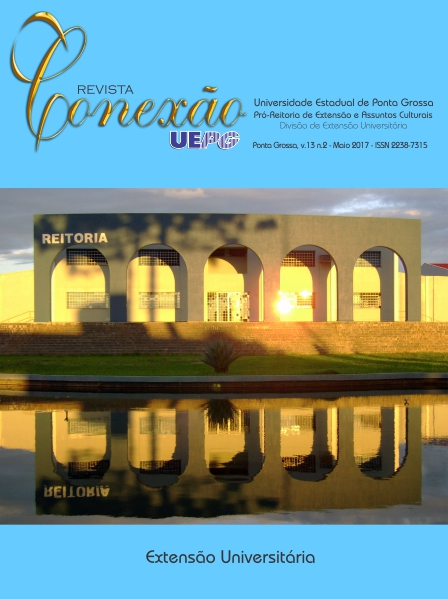CONTAÇÃO DE HISTÓRIAS: O MITO COMO FERRAMENTA DE APROXIMAÇÃO ENTRE A UNIVERSIDADE E POVOS TRADICIONAIS
DOI:
https://doi.org/10.5212/Rev.Conexao.v.13.i2.0002Palavras-chave:
histórias, comunidades, quilombolas, Cariri, transdiciplinaridade.Resumo
O projeto “A botija é nossa: contação de história e sociabilidade no Cariri paraibano” teve desenvolvimento de suas atividades nas três comunidades remanescentes de quilombo do Município de Livramento- PB (Areias de Verão, Sussurana e Vila Teimosa), com o objetivo de fomentar espaços de integração universidade/comunidade. Tais atividades extensionistas ampliam a compreensão de espaço formativo e contribuem na valorização dos sujeitos negros quilombolas. Leva como proposta metodológica a transdisciplinariedade entre as Ciências Humanas e Sociais e a área das linguagens. Neste sentido, a contação e o registro das histórias orais foram assumidas neste projeto como instrumentos metodológicos que possibilitam a percepção/experiência com as dinâmicas de organização desse grupo étnico. Com esta atividade, produzimos experiências formativas aos discentes do curso de Ciências Sociais, bem como para os sujeitos quilombolas, protagonistas dessa ação, aspecto que remete para o princípio da extensão: construir um espaço universitário integrado com as demandas dos sujeitos concretos.Downloads
Referências
ABRAMOVICH, Fanny. Literatura infantil: gostosuras e bobices. São Paulo: Scipione, 1989.
ALMEIDA, Alfredo Wagner Berno de. Os Quilombos e a Novas Etnias. In: O’DWYER, Eliane Cantarino (Org.). Quilombos: identidade étnica e territorialidade. Rio de Janeiro – RJ: Ed. FGV/Associação Brasileira de Antropologia-ABA, 2002. p. 43-81.
ANJOS, Rafael Sanzio Araújo. Quilombos: geografia africana, cartografia étnica, territórios tradicionais. Brasília – DF: Mapas Editora Consultoria, 2009.
CÂMARA CASCUDO, Luís da. Dicionário do Folclore Brasileiro. São Paulo: Global, 2012.
ELIADE, Mircea. Mito e realidade. São Paulo-SP: Perspectiva, 2006.
MATEUS, Ana do Nascimento Biluca et al. A importância da contação de história como prática educativa na educação infantil. Disponível em: http://periodicos.pucminas.br/index.php/pedagogiacao/article/viewFile/8477/7227. Acesso em: 02/02/2016.
RODRIGUES, Edvânia Braz Teixeira. Cultura, arte e contação de histórias. Goiânia, 2005.
SCHMITT, Alessandra; TURATTI, Maria Cecília Manzoli; CARVALHO, Maria Celina Pereira de. A atualização do conceito de quilombo: Identidade e Território nas definições teóricas. Ambiente & Sociedade. Ano V, n.10, set/2002.
SOUZA, Wallace G. Ferreira de. Famílias, Território e Espiritualidades: uma etnocartografia de Caiana dos Crioulos-PB. Tese (Doutorado em Ciências Sociais) – Universidade Federal de Campina Grande-UFCG, Campina Grande, 2014.
VANSINA, J. A tradição oral e sua metodologia. In: KI ZERBO, J. História geral da África, v. 1: Metodologia e pré-história da África. Brasília: UNESCO, MEC, UFSCar, 2010. p. 139-166.
VIEIRA, Isabel Maria de Carvalho. O papel dos contos de fadas na construção do imaginário infantil. Revista criança- do professor de educação infantil, v. 38, p. 10, 2005.
Downloads
Publicado
Edição
Seção
Licença
a) Os autores mantêm os direitos autorais e concedem à revista o direito de primeira publicação, com o trabalho simultaneamente licenciado sob a Creative Commons Attribution License que permite o compartilhamento do trabalho com reconhecimento da sua autoria e publicação inicial nesta revista.
b) Ao submeter um artigo à Revista Conexão UEPG e tê-lo aprovado os autores concordam em ceder, sem remuneração, os seguintes direitos à Revista: os direitos de primeira publicação e a permissão para que a Revista redistribua esse artigo e seus metadados aos serviços de indexação e referência que seus editores julguem apropriados.
c) Os leitores são livres para transferir, imprimir e utilizar os artigos publicados na Revista, desde que haja sempre menção explícita ao(s) autor (es) e à Revista Conexão UEPG e que não haja qualquer alteração no trabalho original. Qualquer outro uso dos textos precisa ser aprovado pelo(s) autor (es) e pela Revista.

Este obra está licenciado com uma Licença Creative Commons Atribuição 4.0 Internacional.





